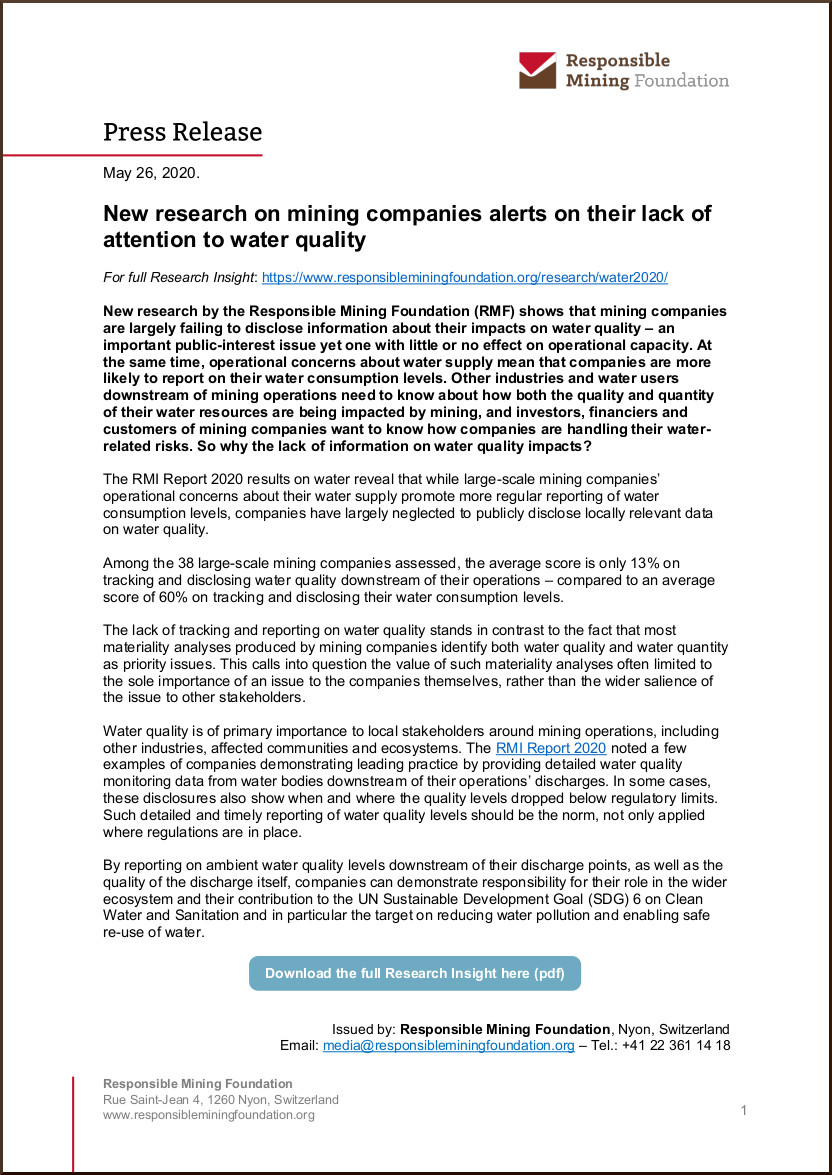New research on mining companies alerts on their lack of attention to water quality

|
Download the Press Release (pdf) ➥ 中文 ➥ English ➥ Español ➥ Français ➥ Bahasa Indonesia ➥ Português (BR) ➥ Pусский |
New research by the Responsible Mining Foundation (RMF) shows that mining companies are largely failing to disclose information about their impacts on water quality – an important public-interest issue yet one with little or no effect on operational capacity. At the same time, operational concerns about water supply mean that companies are more likely to report on their water consumption levels. Other industries and water users downstream of mining operations need to know about how both the quality and quantity of their water resources are being impacted by mining, and investors, financiers and customers of mining companies want to know how companies are handling their water-related risks. So why the lack of information on water quality impacts?
The RMI Report 2020 results on water reveal that while large-scale mining companies’ operational concerns about their water supply promote more regular reporting of water consumption levels, companies have largely neglected to publicly disclose locally relevant data on water quality.
Among the 38 large-scale mining companies assessed, the average score is only 13% on tracking and disclosing water quality downstream of their operations – compared to an average score of 60% on tracking and disclosing their water consumption levels.
The lack of tracking and reporting on water quality stands in contrast to the fact that most materiality analyses produced by mining companies identify both water quality and water quantity as priority issues. This calls into question the value of such materiality analyses often limited to the sole importance of an issue to the companies themselves, rather than the wider salience of the issue to other stakeholders.
Water quality is of primary importance to local stakeholders around mining operations, including other industries, affected communities and ecosystems. The RMI Report 2020 noted a few examples of companies demonstrating leading practice by providing detailed water quality monitoring data from water bodies downstream of their operations’ discharges. In some cases, these disclosures also show when and where the quality levels dropped below regulatory limits. Such detailed and timely reporting of water quality levels should be the norm, not only applied where regulations are in place.
By reporting on ambient water quality levels downstream of their discharge points, as well as the quality of the discharge itself, companies can demonstrate responsibility for their role in the wider ecosystem and their contribution to the UN Sustainable Development Goal (SDG) 6 on Clean Water and Sanitation and in particular the target on reducing water pollution and enabling safe re-use of water.
Or read the Research Insight online: www.responsibleminingfoundation.org/research/water2020
Responsible Mining Foundation
The Responsible Mining Foundation (RMF) is an independent research organisation that encourages continuous improvement in in responsible mining across the industry by developing tools and frameworks, sharing public-interest data and enabling informed and constructive engagement between mining companies and other stakeholders.
As an independent foundation, RMF does not accept funding or other contributions from the minerals and metals industry.